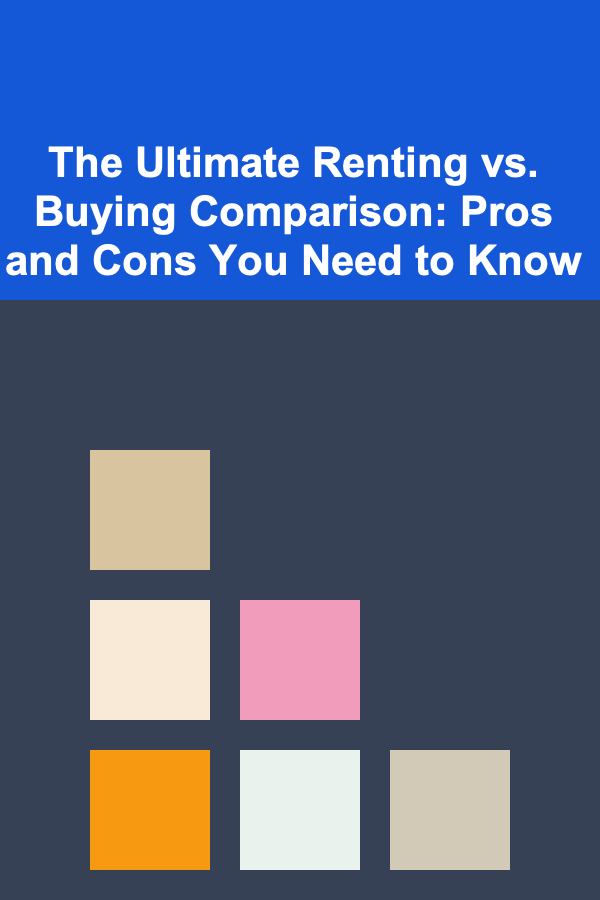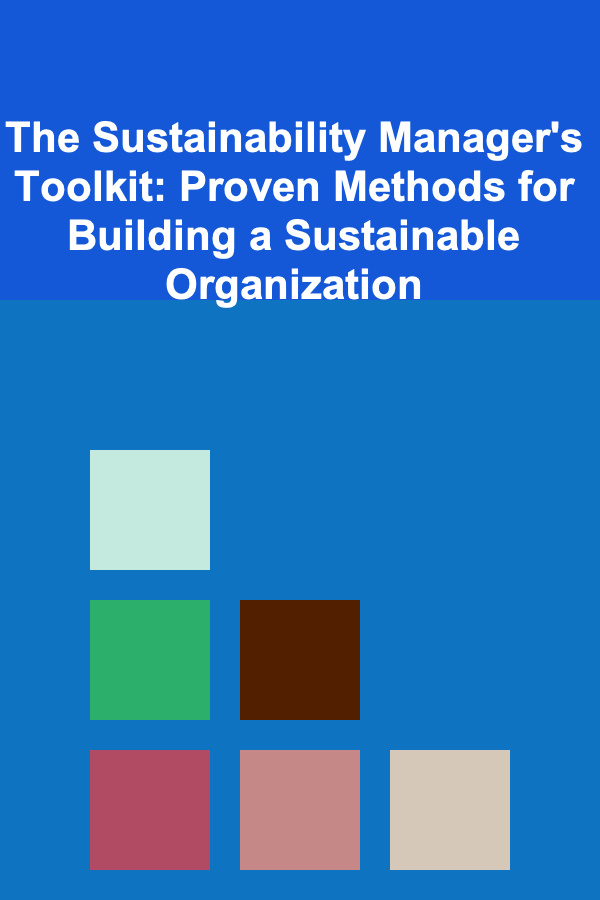
The Ultimate Renting vs. Buying Comparison: Pros and Cons You Need to Know
ebook include PDF & Audio bundle (Micro Guide)
$12.99$10.99
Limited Time Offer! Order within the next:

The decision to rent or buy a home is one of the most significant financial choices you'll make in your life. Whether you're considering purchasing your first home or are already in the process of making that decision, it's crucial to weigh the pros and cons of both renting and buying. Both options have their advantages and disadvantages, and understanding these will help you make a well-informed choice that aligns with your long-term financial goals, lifestyle, and personal preferences.
This article provides a deep dive into the pros and cons of renting versus buying, exploring key factors like financial implications, lifestyle flexibility, and future growth potential. By the end of this guide, you'll have a clear understanding of which option might be the best for your unique situation.
The Case for Renting
Renting a home can offer several benefits that appeal to individuals or families seeking flexibility and reduced financial responsibility. Here's a breakdown of why renting may be the right choice for some people:
1. Flexibility and Mobility
One of the most significant advantages of renting is the flexibility it offers. Renting typically involves short-term leases, often lasting one year, with the option to renew or move once the lease expires. This gives tenants the freedom to relocate for job opportunities, personal reasons, or simply to experience a new neighborhood without the long-term commitment required by homeownership.
-
Pros:
- Ease of relocation: If you need to move for work or lifestyle reasons, renting is much easier than selling a home and buying a new one.
- No commitment: Renting doesn't tie you to a particular location for an extended period, giving you the freedom to explore different places before settling down permanently.
-
Cons:
- Limited control over living space: You may be limited in customizing your living space, whether through renovations, decorations, or even minor modifications.
- Less stability: Rent prices can increase when lease terms are up for renewal, and there's always the risk that a landlord could choose not to renew your lease.
2. Lower Initial and Ongoing Costs
Renting a property usually requires significantly less upfront cost compared to buying. When renting, you typically only need to pay a security deposit and the first month's rent. This is far less than the large down payment required for buying a home, which can often range from 10% to 20% of the purchase price.
Additionally, renters are not responsible for maintenance costs or property taxes, which can be a significant burden for homeowners. In the event of a broken appliance or a leaky roof, tenants can simply call their landlord for repairs.
-
Pros:
- Lower upfront costs: You don't have to save for a large down payment, closing costs, or other purchasing expenses.
- No maintenance or property taxes: The landlord is responsible for repairs and property tax payments, which can save you a significant amount of money.
-
Cons:
- Rent may increase: In the long term, the cost of renting may rise, especially in areas with high demand.
- No equity building: Rent payments do not contribute to building ownership, so you're essentially paying for the privilege of living somewhere without gaining financial assets in return.
3. Lower Financial Risk
Renting can be financially safer in the short term, as you are not at risk of market fluctuations. Home values can go up and down, and buying a property can be a significant financial risk if the market turns or if your personal financial situation changes unexpectedly. Renters, on the other hand, are less exposed to these risks and are not subject to sudden drops in home values or high costs due to unforeseen repairs.
-
Pros:
- Less financial risk: Renters do not have to worry about losing money if the housing market crashes or if property values decrease.
-
Cons:
- No long-term investment potential: Renting doesn't allow you to build equity or benefit from potential appreciation in property value.
The Case for Buying
While renting offers flexibility, buying a home has its own unique set of advantages, especially for those looking for long-term stability, equity growth, and control over their living environment. Below are some reasons why purchasing a home could be the right choice for you.
1. Building Equity
One of the most compelling reasons to buy a home is the opportunity to build equity. When you make monthly mortgage payments, part of that payment goes toward the principal loan amount, which means you're gradually increasing your ownership stake in the property. As home values typically increase over time, you can accumulate wealth through appreciation as well.
-
Pros:
- Equity growth: Homeownership allows you to build equity over time, which can be used to secure future loans or simply as an asset for financial stability.
- Property value appreciation: Historically, property values tend to rise, so the home you purchase today could be worth significantly more in a few years.
-
Cons:
- Risk of depreciation: While homes generally appreciate in value, there's no guarantee. Market downturns or local economic issues could cause your property's value to decrease.
- Slow equity growth: In the early years of your mortgage, the majority of your payments may go toward interest rather than principal, so your equity growth may be slow.
2. Stability and Predictability
Buying a home provides stability, particularly when it comes to monthly housing costs. Fixed-rate mortgages, for example, allow you to lock in your monthly payment for the entire length of the loan (often 30 years). This eliminates the risk of rent increases that renters face. Additionally, you have control over your living environment---no landlord can raise your rent, change your lease terms, or ask you to move out.
-
Pros:
- Predictable monthly payments: With a fixed mortgage, you'll know exactly what your housing costs will be for decades to come, allowing for better budgeting.
- Long-term stability: Once you own your home, it's yours as long as you continue making payments. You don't need to worry about lease renewals or rent hikes.
-
Cons:
- Increased financial responsibility: Homeowners are responsible for all maintenance, repairs, and unexpected costs, which can add up quickly.
- Long-term commitment: Selling a home can be a long and costly process, so you're committed to staying in the property for a significant period of time unless you want to deal with the hassle of selling.
3. Personalization and Control
When you buy a home, you have the freedom to make changes and improvements to the property as you see fit. You can remodel the kitchen, add a deck, or paint the walls however you like---this is something renters generally cannot do without permission from their landlord.
-
Pros:
- Full control over your space: Homeownership allows you to customize your living space to reflect your tastes and needs.
- No restrictions: You aren't limited by a landlord's rules about pets, decorations, or modifications.
-
Cons:
- Costly renovations: While you have the freedom to renovate, it can be expensive. Homeowners are also responsible for the costs of keeping their property in good condition.
- Time-consuming: Homeownership often comes with the responsibility of managing and maintaining your home, which can take up time and energy.
How to Decide: Renting vs. Buying
Ultimately, the decision between renting and buying comes down to your personal situation, including your financial health, lifestyle preferences, and long-term goals. Here are some key questions to ask yourself when making this decision:
- How long do you plan to stay in one place? If you plan on staying in a location for more than five years, buying may be a better option, as you'll likely build enough equity to make the investment worthwhile. If you anticipate relocating frequently, renting offers more flexibility.
- Can you afford the upfront costs of buying? Homeownership involves significant upfront costs, including down payments, closing costs, and moving expenses. If you don't have enough savings, renting can be a more affordable option.
- Do you want stability or flexibility? If you value stability and long-term financial growth, buying may suit your needs. If flexibility is more important, renting may be the better choice.
- Are you ready for the responsibilities of homeownership? Owning a home comes with additional responsibilities, such as maintaining the property, paying property taxes, and dealing with unexpected repairs. Consider if you're ready for these commitments.
Conclusion
There is no one-size-fits-all answer to the question of renting vs. buying. Both options come with their own set of benefits and challenges, and the right choice depends on your financial situation, lifestyle, and long-term goals. Renting provides flexibility and lower upfront costs, but offers no equity or long-term investment potential. Buying offers stability, equity growth, and control over your living space but comes with higher upfront costs, maintenance responsibilities, and long-term commitment.
By carefully evaluating your needs and preferences, you can make an informed decision that aligns with your personal and financial goals. Whether you choose to rent or buy, it's essential to approach the decision thoughtfully to ensure that your housing choice supports your overall life plan.
Other Products

How to Create a Digital Time Management App: A Comprehensive Guide
Read More
How to Make Money Online as a Chemist? 10 Actionable Ideas
Read More
How to Organize Your Home Maintenance Schedule Effectively
Read More
How to Use Stackable Storage for Maximizing Space
Read More
Navigating Complexity: Best Practices for Effective Operations Analysis
Read More